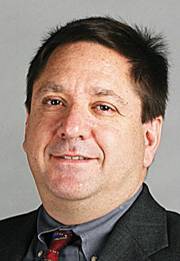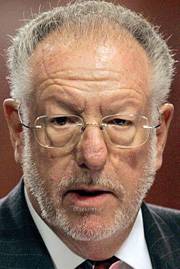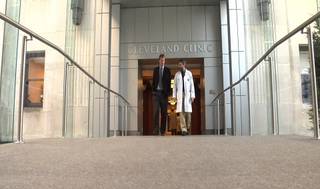Tuesday, Sept. 29, 2009 | 2 a.m.

Dr. Ron Kline says local providers had chance with brain institute.

Mayor Oscar Goodman is impatient with local medical community.
Sun Archives
- The city's budding love affair with the Cleveland Clinic (9-24-2009)
- Medical community embraces alliance (2-18-2009)
- Ruvo’s dream becomes real (2-17-2009)
- Ruvo's mission is bold, driven by love (2-17-2009)
- Gehry's design elevates awareness of Alzheimer's disease, research (2-17-2009)
- In Cleveland, patients are priority (2-17-2009)
- Aiming to revolutionize dementia research (1-7-2009)
- Brain institute thinking big (12-24-2008)
Sun Coverage
Lou Ruvo Brain Institute

Viewing video requires the latest version of Adobe's Flash Player
Local medical providers who grouse about the Cleveland Clinic’s burgeoning presence in Las Vegas should remember: They had their chance.
That’s the history lesson offered by Dr. Ronald Kline, president of the Nevada State Medical Association, the state’s largest organization of doctors.
Before Cleveland Clinic came to Las Vegas, the University of Nevada School of Medicine was going to run the then-named Lou Ruvo Brain Institute. That deal fell through after four years, opening the door for the Cleveland Clinic, which in February took over the clinical and research operations of what is now named the Cleveland Clinic Lou Ruvo Center for Brain Health.
Cleveland Clinic is now looking to expand its operations in downtown Las Vegas’ Symphony Park, possibly aided by a land donation from the city. The Cleveland Clinic’s expansion from outpatient treatment for brain disorders to other types of treatment would likely cut into the paying business of local doctors and hospitals.
Some doctors are grumbling about the Cleveland Clinic’s motives. One local doctor who did not want to be named said, in so many words, that no one should think that the Cleveland Clinic’s arrival here is about fixing local health care shortcomings. It’s all about money, he said.
“They’re in a dying Midwestern city. It’s like a bad ‘Star Trek’ episode where people on a dying planet are trying to get off.”
The Cleveland Clinic is one of the nation’s largest hospitals and boasts a top-10 ranking by U.S. News & World Report in multiple specialties. President Barack Obama has praised the Cleveland Clinic as a model because of its high-quality and cost-effective care.
The local medical community has defended its turf from outsiders in the past.
In 2003, the Cleveland Clinic explored opening a hospital in Las Vegas. The University of Pittsburgh looked into starting a teaching hospital here in 2006. Both proposals were opposed by local medical providers.
Las Vegas Mayor Oscar Goodman, an outspoken Cleveland Clinic fan, said the dissent was rooted in doctors and hospitals trying to protect their profits. Now when local doctors tell the mayor they don’t want Cleveland Clinic expanding he tells them to “drop dead.”
Kline is a bit more constructive, suggesting that the critics — he was among those who opposed the Pittsburgh proposal — should remember their past shortcomings.
In 2004 businessman and philanthropist Larry Ruvo joined forces with the University of Nevada School of Medicine, which was to run the medical operations of the brain clinic.
What followed was a clash of cultures.
Ruvo thinks big. The businessman wants to make Las Vegas the worldwide epicenter for innovations in Alzheimer’s care and research. His father, Lou, died of the disease, and he is determined to change the way the medical community addresses brain disorders.
Ruvo enlisted world-renowned architect Frank Gehry to design an iconic building to serve as the Brain Institute’s headquarters. The $100 million building, under construction in Symphony Park, would have essentially been given to the school of medicine.
But the partnership broke down in 2008. A source familiar with the situation said the school lacked the leadership, money and vision to help the joint endeavor thrive.
Dr. John McDonald, the school’s dean at the time and now vice president of health sciences at the University of Nevada, Reno, said it came down to the medical school not being able to satisfy the Ruvo team’s requirements.
“We’re a small school with limited resources,” McDonald said. “It would have been very difficult to undertake the support of the center in a way they had anticipated.”
Cleveland Clinic is a $4.8 billion institution. In contrast, the University of Nevada School of Medicine has a budget of about $150 million, McDonald said.
“We’re a pea compared to their cantaloupe,” McDonald said, adding that he’s delighted by the new partnership.
Kline said the medical community opposed the Pittsburgh proposal because local doctors wanted a chance to prove themselves, showing that they could build a world-class institution like their out-of-state counterparts. After the Pittsburgh option failed, Kline helped lead an advisory committee of local hospitals, medical schools and doctors that explored developing a homegrown academic medical center. He said that once the outside threats went away, the group’s intensity fizzled.
Kline said he knows of no organized opposition to the Cleveland Clinic in Las Vegas, and hopes that if the clinic does grow it competes on a level playing field. Other groups won’t get free land, he pointed out.
But the local medical providers who don’t want the Cleveland Clinic growing in Las Vegas should remember the failed partnership with the school of medicine.
“Larry Ruvo wanted to hand the medical school a $100 million building and they couldn’t agree about how to run it,” Kline said, adding that he doesn’t know who was at fault in the breakup. “If the school of medicine runs (the Lou Ruvo Brain Institute) then there’s no Cleveland Clinic here.”
Sun researcher Rebecca Clifford contributed to this story.

Join the Discussion:
Check this out for a full explanation of our conversion to the LiveFyre commenting system and instructions on how to sign up for an account.
Full comments policy